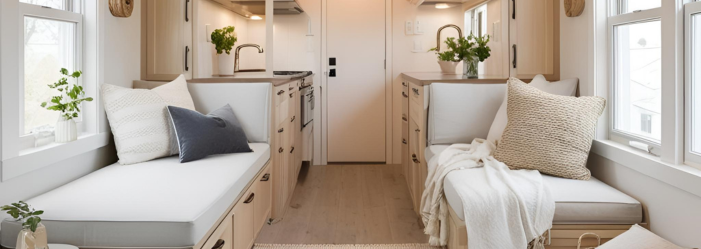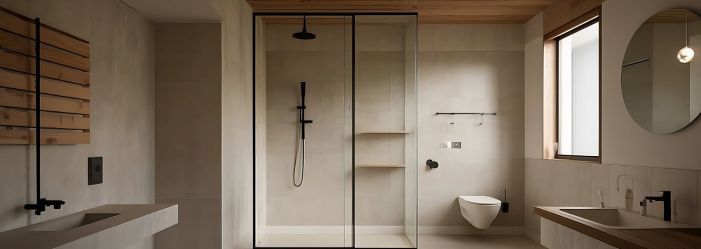Basement Flooring 101: The Best Options for Your Space!
Choosing the Right Flooring for Your Basement

Your basement is one of the most versatile spaces in your home. Whether you’re transforming it into a cozy family room, a home gym, or even a rental suite, the right flooring can make all the difference. But because basements are prone to moisture and temperature fluctuations, choosing the right material is key to a durable and comfortable space.
In this guide, we’ll break down the best basement flooring options, their pros and cons, and what to consider before making a decision.
1. Luxury Vinyl Plank (LVP) & Tile (LVT) – The Waterproof All-Star
Why It’s Great for Basements
Luxury vinyl plank (LVP) and luxury vinyl tile (LVT) have become popular for basement flooring because they are 100% waterproof and mimic the look of real wood or stone without the associated maintenance.
Pros
- Waterproof and moisture-resistant
- Durable and scratch-resistant
- Wide variety of styles and colors
- Warmer underfoot than tile
Cons
- Can be more expensive than other vinyl options
- Requires a smooth subfloor for proper installation
💡Best for: Finished basements, rental suites, and family rooms
2. Engineered Hardwood – The Elegant Choice
Why It’s Great for Basements
If you prefer the look of real hardwood but are concerned about moisture, engineered hardwood is a great alternative. Its layered construction makes it more resistant to warping compared to solid wood.
Pros
- Adds warmth and a high-end look
- More moisture-resistant than solid hardwood
- Can be refinished (depending on thickness)
Cons
- More expensive than vinyl or laminate
- Not completely waterproof—requires a dry basement
💡Best for: Luxury basement spaces, home offices, or media rooms
3. Tile – The Durable Classic
Why It’s Great for Basements
Tile is one of the most durable flooring options and is completely waterproof, making it ideal for high-moisture areas.
Pros
- Waterproof and long-lasting
- Easy to clean and maintain
- Wide variety of styles, including stone and wood-look
Cons
- Cold underfoot (consider adding radiant heating)
- Hard surface—less comfortable for play areas
💡Best for: Basement bathrooms, laundry rooms, and bar areas
4. Carpet – The Cozy Option
Why It’s Great for Basements
For homeowners prioritizing comfort, carpet is a fantastic choice. It adds warmth and reduces noise, making it ideal for family-friendly spaces.
Pros
- Soft and comfortable underfoot
- Great soundproofing qualities
- Warmer than tile or vinyl
Cons
- Can absorb moisture and develop mold if not maintained
- Stains more easily than other flooring types
💡Best for: Playrooms, bedrooms, and basement theaters
5. Laminate – The Budget-Friendly Alternative
Why It’s Great for Basements
Laminate offers the appearance of hardwood at a lower price point. While it is more water-resistant than real wood, it should not be exposed to standing water.
Pros
- More affordable than hardwood or vinyl
- Scratch-resistant and durable
- Available in many styles
Cons
- Not waterproof—prone to swelling if exposed to moisture
- Can be slippery without a textured surface
💡Best for: Budget-friendly basement renovations or temporary flooring solutions
6. Rubber Flooring – The Gym-Ready Solution
Why It’s Great for Basements
For those converting their basement into a home gym, rubber flooring is an excellent option. It absorbs impact and provides a non-slip surface.
Pros
- Excellent shock absorption for workouts
- Water-resistant and easy to clean
- Provides insulation against cold floors
Cons
- Limited style options
- May have an initial rubbery smell
💡Best for: Home gyms, kids’ play areas, and workshops
New Paragraph
Why It’s Great for Basements
Epoxy is a seamless, durable flooring option that can be applied directly over concrete. It works well in basements used as workshops or storage areas.
Pros
- Waterproof and stain-resistant
- Extremely durable and long-lasting
- Easy to clean
Cons
- Can be slippery when wet
- Requires proper surface preparation for installation
💡Best for: Workshops, garages, and low-maintenance basement spaces
Final Tips for Choosing the Right Basement Flooring
Before making a decision, consider the following:
- Moisture Levels: If your basement tends to be damp, avoid materials like carpet or laminate unless you install a vapor barrier.
- Intended Use: Consider how the space will be used—family rooms need comfort, while gyms require durability.
- Installation & Budget: Some materials, such as epoxy and tile, require professional installation, while others, like LVP and carpet, can be DIY-friendly.
- Temperature Considerations: Basements tend to be cooler, so adding area rugs, underlayment, or even radiant heating beneath tile can enhance comfort.
Ready to Upgrade Your Basement Flooring?
At Elevate Design & Build, we specialize in basement renovations in Okanagan. Whether you need a stylish, waterproof solution or a cozy, carpeted retreat, we can help you find the best flooring option for your space.
Contact us today for a consultation and let’s transform your basement!



